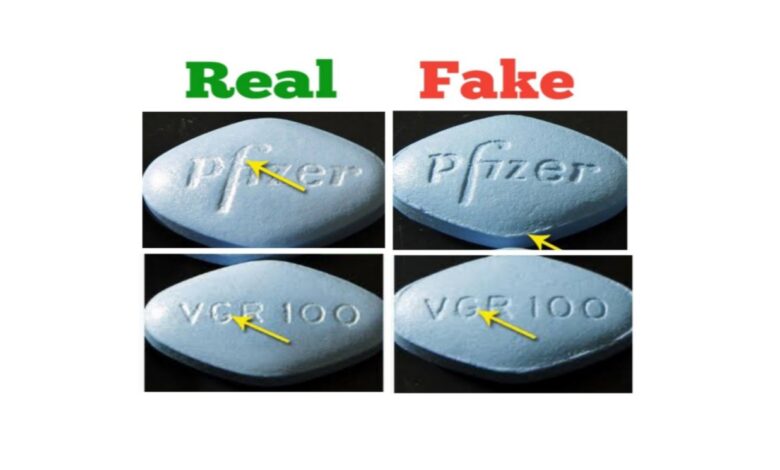What Do Fake Viagra Pills Look Like?

What Are Counterfeit Medicines?
WHO defined a counterfeit medicine as: “a medicine which is deliberately and fraudulently mislabeled with respect to identity and/or source. A counterfeit medication or a counterfeit drug is a medication or pharmaceutical item which is produced and sold with the intent to deceptively represent its origin, authenticity or effectiveness.
A counterfeit manufacturer operates outside of the regulatory frameworks that protect consumers, and they can sell products of low quality that harm consumers without being held accountable. In some cases, patients are killed by medicines with fake, poor quality or the wrong ingredients. Not all counterfeit drugs are of poor quality, however, and some WHO experts have estimated that a significant amount of high quality counterfeits are sold to consumers.
What is Viagra?
Viagra (sildenafil) relaxes muscles found in the walls of blood vessels and increases blood flow to particular areas of the body. Viagra is used to treat erectile dysfunction (impotence) in men. Another brand of sildenafil is Revatio, which is used to treat pulmonary arterial hypertension and improve exercise capacity in men and women.
Erectile dysfunction pills are one of the most counterfeited drugs in the world. 3.5 million fake erectile dysfunction drugs were seized in 2019 in the UK alone. This means that a high percentage of products marketed on-line as Viagra, aren’t actually Viagra. Fake Viagra is of serious concern, because it is impossible to know exactly what it contains and what side effects it could cause. A misconception is that the worst possible outcome of taking counterfeit Viagra is that it won’t work. But the reality could be much more serious. Often produced in unsanitary and substandard conditions, these drugs are commonly manufactured with harmful ingredients and fillers.
What does Viagra look like?
Viagra is a diamond-shaped blue, film-coated, tablet that is available in three strengths: 25 mg, 50 mg, and 100 mg. For Viagra to work properly, it should be taken an hour before sex on an empty stomach.
Viagra dosage is not based on weight, but your age can affect your dosage. Specifically, you may have a lower starting dosage than usual if you’re over age 65. For example, a 30-year-old might start at a dose of 50 milligrams (mg), while a 70-year-old might have a starting dose of 25 mg.
What do fake Viagra pills look like?
The trouble is, fake Viagra can look EXACTLY like legitimate Viagra, with a few minor differences.
- Color consistency: Real Viagra is uniform in color. Fake Viagra may have variations of color within the same tablet, or between different tablets in the same packet. The color on one side of a fake tablet may look different from the color on the other side.
- Look at the “f” in Pfizer: The “f” is unique and hard to replicate, especially if you are making a stamp to mark individual pills. The stem on the real “f” doesn’t start thinning out until it is almost at the top.
- Tablet shape: A real Viagra tablet has a distinct diamond shape with smooth edges. Fake Viagra tablets are usually quite jagged with an indent before the edge.
- Number of tablets per pack: Real Viagra is available in single packs or packs of 4. If your packet contains more than 4 tablets, it is likely counterfeit.
Always buy your Viagra through the correct channels and from a reputable source. Since the 11th of December, 2017, Viagra has been available as a generic in the United States. Generics are usually considerably cheaper than the original branded version of a drug.

With fake medicines, which could be made by anyone, with any ingredients, in any conditions, there’s no testing or regulation to ensure that what you’re buying is real or safe. As well as containing the wrong active ingredient, or the wrong amount of the right active ingredient, some counterfeit medications have even been found to contain toxic materials such as paint, printer ink and arsenic.
Medicines sourced from outside the authorized supply chains offer no such guarantee and consequently pose risks to patient health. The medicines supplied are unlikely to be the authorized versions. Not only are they operating illegally but they are operating with a blatant disregard for public health.





